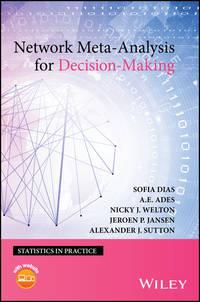Network Meta-Analysis for Decision-Making

Sofia Dias and Alexander Sutton
Genre:mathematics
Language:English
Type:PDF book
Publisher:John Wiley & Sons Limited
Publication date:09.12.2022
Price:$112.18
Views:56
A practical guide to network meta-analysis with examples and code In the evaluation of healthcare, rigorous methods of quantitative assessment are necessary to establish which interventions are effective and cost-effective. Often a single study will not provide the answers and it is desirable to synthesise evidence from multiple sources, usually randomised controlled trials. This book takes an approach to evidence synthesis that is specifically intended for decision making when there are two or more treatment alternatives being evaluated, and assumes that the purpose of every synthesis is to answer the question “for this pre-identified population of patients, which treatment is ‘best’?” A comprehensive, coherent framework for network meta-analysis (mixed treatment comparisons) is adopted and estimated using Bayesian Markov Chain Monte Carlo methods implemented in the freely available software WinBUGS. Each chapter contains worked examples, exercises, solutions and code that may be adapted by readers to apply to their own analyses. This book can be used as an introduction to evidence synthesis and network meta-analysis, its key properties and policy implications. Examples and advanced methods are also presented for the more experienced reader. Methods used throughout this book can be applied consistently: model critique and checking for evidence consistency are emphasised. Methods are based on technical support documents produced for NICE Decision Support Unit, which support the NICE Methods of Technology Appraisal. Code presented is also the basis for the code used by the ISPOR Task Force on Indirect Comparisons. Includes extensive carefully worked examples, with thorough explanations of how to set out data for use in WinBUGS and how to interpret the output. Network Meta-Analysis for Decision Making will be of interest to decision makers, medical statisticians, health economists, and anyone involved in Health Technology Assessment including the pharmaceutical industry.